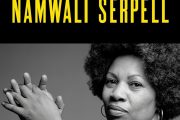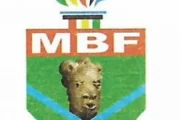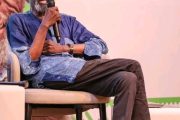The Voyage of Igbo Presidency
By Adagbo ONOJA
Igbo Presidency has sneaked into currency in Nigerian politics. That must be traceable to the name behind the concept in its present usage: General Obasanjo who recently pronounced Igbo Presidency as the cure for Nigeria’s political stasis. As the most tested godfather in Nigeria today, whatever he gets into creeps into currency, as both those who endorse and those who attack him would be feasting on a same concept or practice. Otherwise, Igbo Presidency is an old concept referring simply to a Nigerian president of Igbo ethnic identity. It is a concept with its own mystique in so far as it inherently refers to bringing the Nigerian Civil War to its most symbolic close. The war is nearly 50 years old by now but, in Igbo popular psyche, it seems only Igbo Presidency can be that final Act, the only symbol magnificent enough because it would restore the break in Igbo headship of the Nigerian State since 1966.

Gen Obasanjo
Within that period, the northern minorities; northern majority; south-west majority and southern minorities have held the office. Igbos are, in this sense, the missing ethnic group in a country where the ethnic rather than the civic identity counts more in the conception of citizenship. The question of how Igbos achieve presidential power has thus been a long struggle.
It is interesting that the first attempt was by the same Chukwuemeka Odumegwu Ojukwu, the late war lord. It was an indirect strategy. He first sought to enter the Senate. The NPN allowed him to contest the election in 1983 but also ensured he was defeated by a young medical Doctor from the Nigerian People’s Party, (NPP) whose name this reporter cannot recall immediately. It was something like Dr. Edwin Onwudiwe. It was a dramatic defeat. A Sunday Concord centrespread on Ojukwu’s defeat was titled “The Deflation of an Ego”. It was either that Ojukwu sent the signals or NPN found out on its own that he had an agenda to contest the Senate Presidency if he won the election. As a party built on a sensitive balance of cultural interests, the NPN could not afford any disturbance to that balance. It was, therefore, apprehensive of an Ojukwu who could easily displace Joseph Wayas or take the Senate Presidency from the COR axis. Second, there was the Ojukwu return to the country after his pardon with fanfare as if the war was a picnic. Many people expressed reservations, particularly that he raised an ‘army’ with which he was confronting the Jim Nwobodo regime in Anambra. There was a particular clash between his ‘army’ and Nwobodo’s vigilante at Nkpor Junction in the old Anambra that really suggested to observers that, given another opportunity, Ojukwu could disturb the established order again. The NPN was monitoring all these, particularly the reservations filtering in from the military at the background. The last point against him was the scenario analysis about what would stop this man with his own conception of History from advancing to be recognised for the presidency in a disruptive manner. His defeat in the 1983 election blocked any other advance on his part and as someone who could have been an Igbo president.

Dr Alex Ekwueme in the midst of other Igbo leaders
If the end of year coup in 1983 did not take place, the next earliest time it would have been realised was October 1987. Alex Ekwueme who was Vice-President to Shehu Shagari in a solid, realisable zoning principle would have got it. Till today, Ekwueme believes the 1983 coup was essentially organised to truncate his ascendancy. He finds it difficult to connect the coup to hegemony threatening developments that democracy was throwing up in the north or to any independent junta calculus of power. Anyway, instead of becoming the president in 1987, he became a detainee four years earlier.
In the 1985 coup, Ebitu Ukiwe, a Naval Commodore of Igbo identity emerged as the Vice-President to the self declared military president. Coming from the military, this selection was not greeted with the case of Ekwueme whose emergence as Vice-President was considered too fast for an ethnic group that sought to break the country. However, Ukiwe did not last. He fell to the dynamics of junta politics. Not that Ukiwe would have succeeded IBB in the same way Ekwueme would have succeeded Shagari but Ukiwe was a powerful symbol or continuation of the three Rs (Rehabilitation, Reconstruction and Reconciliation) proclaimed at the ended of the war.
The brightest chance for the realisation of the Igbo Presidency came in 1998/99. The rump of the major political tendencies in Nigeria had coalesced into a mega party. Beyond being the biggest pan-Nigerian political party ever, it came with a message that could be implied to be an explicit commitment to a president of Igbo identity. The northern elements in opposition to Abacha had approached Ekwueme in recognition of his being Shagari’s successor to provide leadership for their anti-Abacha politics. They wanted him to lead them. The former Vice-President wanted a demonstration of their sincerity which was what gave rise to the first letter against Abacha’s self-succession by 18 politicians of northern origin by the group identity of G-18. It was to be G-19, one politician each from the 19 northern states. Somehow, the late Sunday Awoniyi did not get to sign the letter.

Alhaji Shehu Shagari, Second Republic President of Nigeria, 1979-1983 and under whom Dr Ekwueme served as Vice-Pesident
With the letter which shocked Nigerians as well as fulfilled Ekwueme’s guarantee of sincerity, he accepted the leadership of the opposition of Nigerian politicians to Abacha’s self-succession game. The platform now metamorphosed into G-34 which mutated subsequently into the People’s Democratic Party, (PDP). In other words, Ekwueme had a head start in terms of becoming the presidential candidate and the president of Nigeria more than anyone else in the PDP. He had a strong grip of the north. It is a long time now but most journalists reporting northern Nigeria might readily recall the spread of his grip. Shehu Shagari, his former principal, was in approval. In fact, Bala Shagari, a retired Major and a son of the former president was the Sokoto State Coordinator for Ekwueme. Audu Ogbeh, incumbent Minister for Agriculture, was the Director-General of his campaigns. Aminu Wali who gave the PRP the toughest time in Kano in the Second Republic headed the Kano squad while Ali Baba, Shagari’s Minister of Internal Affairs in the Second Republic was in charge in Adamawa along with Bamanga Tukur while Engineer Muhammad Abba Gana, Obasanjo’s first term FCT Minister in this republic along with Ashiekh Jarma manned Borno. With Sokoto, Borno, Kano and Benue in the grip and with the old NPN establishment basically back together, he was well on his way to power, assuming he got the southern part of the country too. But a different plan was also afoot elsewhere.
But the retired Generals, (the correct protocol is that Generals do not retire) had their own candidate. The first problem with the candidate was that he was a prisoner. As it turned out, this was the least of the problems of the Generals. Their major problem was how to crush the massing up of crack NPNers, particularly those like Adamu Ciroma who had squarely blamed the military for the Nigerian crisis in the rule book he wrote for Shagari’s second term. Although Ciroma was the declared favourite of some of the retired Generals such as T Y Danjuma for exactly the reasons that he was disfavoured by the northern establishment – his independent mindedness, it was the same TY Danjuma who fired the first shot at Ekwueme candidature when they succeeded in getting Obasanjo pardoned and gazetted. He said he would go on exile if Obasanjo did not win. It was only in his February 2008 interview in The Guardian that he came to explain the basis of that statement, a basis completely different from the view of it as hatred for Igbos.

His Majesty Alfred Nnaemeka Achebe, the Obi of Onitsha, key traditional ruler of the Igbos
The military elements eventually found away round the problem which was not unconnected with personal sub-scripts within the larger group agenda, the normal fear of combatants that the people the people they were asked to fight would, in their life time, be given power. At least, that was invoked as publicly stated by the late Sunday Awoniyi at the Yar’Adua Centre shortly after the rough visit to his house by then President Obasanjo in Abuja on self-invitation. Awoniyi had been a one man opposition to Obasanjo candidature. But, by his own admission, he was the one tasked with conveying the argument of the militariat across the centres of influence.
Still, there was a group that remained with Ekwueme till his defeat at the PDP convention in Jos. The leading figure here would be Adamu Ciroma, they went along with Ekwueme up to the Jos Convention where Obasanjo emerged the candidate. In fact, in an interview with the Weekly Trust edition devoted to the convention, (February 12 – 19th, 1998), Ciroma paid tribute to Obasanjo for being such a formidable aspirant in spite of coming from a ‘barren’ area which had rejected him, but said Obasanjo with his backers could win the primaries in Jos only to lose the presidential election later that month because “the elite in the west who are Action Group and UPN oriented have denied General Obasanjo political recognition”. He, therefore, argued that the PDP was going to risk so much by giving its ticket to Obasanjo who was not sure to garner much votes from his area when there was Ekwueme whose area was bound to vote for him before he gathered more from other parts of the country. The interview was instructively titled “Obasanjo May Win the Battle But Lose the War”.
With the division in the NPN ranks and in the north, the resource capability of the military elements, their familiarity with state processes and the advantage of military tactics, Ekwueme was bound to be worsted in Jos. That was exactly what happened, closing the most opportuned moment for Igbo Presidency. His attempt to contest in 2003 did not pull much force. In fact, by beating Aliyu Gusau and Jerry Gana to come second in 2007 PDP presidential primaries, Rochas Okorocha is the Igbo man who has come closest to the Nigerian presidency since 1966.

Chief Vincent Ogbulafor, National Chairman of the PDP at the time the zoning debate broke out in the aftermath of Yar’Adua’s death
It is still a puzzle that the Igbos did not state their position on the debate on zoning in 2010/2011 except if what Vincent Ogbulafor said was Igbo position which wasn’t the case. If the north got her four years from 2011 – 2015, it would have been Igbo Presidency in 2015 because it is unlikely that power returned to the south and the southern minorities would get it before the majority ethnic group. Perhaps, things might not have worked this straight forward manner in the context of insurgency in the south-south. In the event of Jonathan as a factor already on the ground, there might have been no room for Igbos to manoeuvre in pursuit of Igbo Presidency in 2011 without implications for minority-majority relations in that axis in southern Nigeria.
Now, the All Progressives Congress, (APC) hasn’t got a very categorical commitment to zoning as with NPN or the PDP. This is perhaps why Obasanjo is talking about Igbo Presidency in 2019. Otherwise, zoning implies two terms for every region. Within that context, Igbo Presidency could happen in 2019. But, with 17 out of the 24 or so APC governors in the country, would any other region successfully snatch the presidential ticket from the north in 2019? This will be a major question when the time comes, particularly if compensation for the lost five years of Umaru Yar’Adua is brought into the argument.
The second plausible path is the PDP, should it manage to come out of the intensive care unit where Obasanjo, its first presidential product, says it is. Here, an Igbo president in 2019 is least likely given that the PDP was defeated mainly for violating its own core article of faith – zoning. The third option is the mega party in formation. This has the best prospects for an Igbo Presidency in 2019. The problem here, however, is whether a ruling party willing, ready and capable of using state power can be defeated again. One of the mysteries of Goodluck Jonathan is that he did not use state power. The strength of the perception of that government was perhaps too strong for him to use state power or the forces against that regime were too strong. Otherwise, there were grounds to block APC from winning. They were shocked to learn they had won or that Jonathan conceded defeat. Now, the APC is not the same as the Jonathan government. Might the opposition to them by 2019 be such that they would allow themselves to be defeated?

Potential kings and king makers?
What about the emerging situation whereby leading politicians of Igbo origin are massing up in APC? Is it just escape from EFCC or anything of that nature? As at last count, the list stretched from Ken Nnamani, Jim Nwobodo, Orji Kalu and Andy Uba. Many more might join them. It is not that they themselves may be kings but they may make kings. Whichever way it is seen, a leadership recruitment process appears to be unfolding in the south east at the level of APC: Ken Nnamani, Ogbonnaya Onu, Orji Kalu, Chris Ngige, Rochas Okorocha, Andy Uba, among others. If the APC is gender conscious, then that dimension might account for dragging in the Chris Anyanwus of this world into the emerging circuit in the APC in eastern Nigeria from where enigmatic statements are already emerging. Rochas Okorocha, the Imo State governor, says the Igbos are backing Buhari in 2019. Could that be a negotiation of the Vice-Presidential space in 2019 and, by implication, positioning for a later date outing? Or a ground testing intervention?
Doesn’t the formation of an ethnic army – IPOB – discredit an Igbo claim on national power? Some people would say it does, coming immediately after a regime in which Igbo hegemony was nearly 100 per cent. Others would take a larger contextual view and argue that Nigeria lost the opportunity to sort out the issue in 1999. One of the arguments posed in favour of Ekwueme presidency in 1999 was that voting the Yorubas into power then was tantamount to rewarding insurgency because the Yorubas formed an ethnic army. Although they managed to control its usage, it was no less an uprising. The Obasanjo factor was perhaps too much for this debate to go far enough in 1998. Jonathan owes his emergence essentially to the insurgency in the Niger Delta. There is a strong belief now that Boko Haram gave Buhari power. Igbos are, therefore, likely to argue that even if it were, they would not be the first to instrumentalise an ethnic army in pursuit of national power.
In a deeply divided society such as Nigeria, the voyage of a concept such as Igbo Presidency can no longer be ignored because no one appears to know which concept is hiding the answer to the trouble with Nigeria. Perhaps, when it happens, Igbo Presidency might give Nigeria opportunity to prove that leadership is the trouble with Nigeria which Chinua Achebe popularised. There is an idealism worth exploring there. But, is this not achievable without fire and brimstone? Or is this evidence of the claim that Africa works by the ‘Instrumentalization of Disorder’?




























